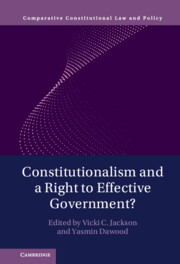Book contents
- Constitutionalism and a Right to Effective Government?
- Comparative Constitutional Law and Policy
- Constitutionalism and a Right to Effective Government?
- Copyright page
- Dedication
- Contents
- Tables
- Contributors
- Acknowledgments
- Part I Introduction
- Part II What Are Constitutions For?
- 2 Resolution and Accommodation in the Good Constitution
- 3 Effective Governance and the Social Dimension of the Rule of Law
- 4 Effective Government and the Two Faces of Constitutionalism
- 5 The Right to Effective Self-Government
- Part III Positive Rights and Rights to Effective Self-Government
- Part IV The Role of Courts in Building State Capacity and Promoting Effective Self-Government While Protecting Rights
- Part V Executive and Administrative Constitutionalism in Effective Democratic Government
- Part VI Legislatures, Representation, and Duties of Effective Self-Government
- Part VII Politics, Sociology, Media, and Corruption as Contexts for Constitutionalism and Governance
- Index
3 - Effective Governance and the Social Dimension of the Rule of Law
from Part II - What Are Constitutions For?
Published online by Cambridge University Press: 20 October 2022
- Constitutionalism and a Right to Effective Government?
- Comparative Constitutional Law and Policy
- Constitutionalism and a Right to Effective Government?
- Copyright page
- Dedication
- Contents
- Tables
- Contributors
- Acknowledgments
- Part I Introduction
- Part II What Are Constitutions For?
- 2 Resolution and Accommodation in the Good Constitution
- 3 Effective Governance and the Social Dimension of the Rule of Law
- 4 Effective Government and the Two Faces of Constitutionalism
- 5 The Right to Effective Self-Government
- Part III Positive Rights and Rights to Effective Self-Government
- Part IV The Role of Courts in Building State Capacity and Promoting Effective Self-Government While Protecting Rights
- Part V Executive and Administrative Constitutionalism in Effective Democratic Government
- Part VI Legislatures, Representation, and Duties of Effective Self-Government
- Part VII Politics, Sociology, Media, and Corruption as Contexts for Constitutionalism and Governance
- Index
Summary
Assuming that effective governance refers to the state’s regulatory powers over private natural and legal persons, it is fair to say that it has been the poor cousin of constitutionalism. Liberal constitutional thought has been largely preoccupied with the need to restrain executive power rather than to justify it.1 That was true first of its focus on royal prerogative power, later of its antagonism toward rule by executive decree or legislation, and into the twentieth century of its uncertain aversion to regulation. Those theorists and public lawyers that resisted that narrative of ‘constraint’, predominantly on the social democratic left, would for the most part choose the language of democracy as their contrarian justificatory framework.2 The contest has similarly played out across the twentieth century in British constitutional thought through an argument between parties who align themselves, roughly put, with one of two supposedly competing principles at the core of the British constitution: the sovereignty of Parliament and the rule of law.3 None of the parties to that dispute are concerned to make the case for executive power per se.
Keywords
- Type
- Chapter
- Information
- Constitutionalism and a Right to Effective Government? , pp. 34 - 46Publisher: Cambridge University PressPrint publication year: 2022

